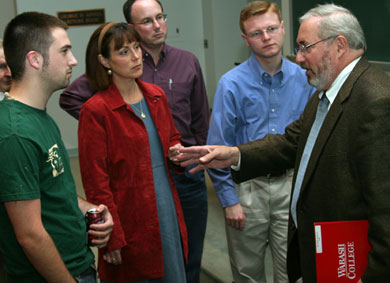John Agresto went to Iraq in 2003 convinced that the war was justifiable,"that if the United States' efforts in the region succeeded, the world would be a far better place than it was at the turn of this new century."
"But we are not succeeding," Agresto told a Wabash College audience Monday night. "And I want to tell you why."
 Agresto said that after nine months in Iraq, he returned to the U.S. "mugged by reality."
Agresto said that after nine months in Iraq, he returned to the U.S. "mugged by reality."
As Senior Coalition Advisor to the Iraqi Ministry of Higher Education and Scientific Research, Agresto's mission was to help rebuild the country's educational system. He came away with lessons learned about what can go wrong when American naivete and incompetence engages a people twisted by three decades of tyranny under the rule of Saddam Hussein.
"I saw firsthand the evil that tyranny brings, how a society of fear breaks all decent human connections; how in such a country people learn only two things: either to obey, or to command," Agresto said.
The level of distrust was so pervasive that a custom of marrying cousins had begun during Saddam's reign. "Better to marry within the family," an Iraqi told him. "You can't be too careful."
Even after the capture of Saddam, many Iraqis feared that Americans would make a deal with the former dictator for oil or for bases in the region and that those who collaborated would be turned over to Saddam's regime.
"Tyranny built a culture of fear that nothing could easily erase," Agresto said. "The images of prisoner abuse at Abu Gharib further burned this notion into the minds of Iraqis."
Agresto added that America's largely positive view of the role religion played in shaping the American character and democracy led to a kind of "foolish thinking that all religions are good—that they all preach peace, tolerance, and brotherly love, and that only cults are wild and dangerous.
"I am not one who believes we have an enemy in Islam," Agresto insisted. "But we did not understand that the fervor of religion might have to be tamed in order for there to be democracy."
The former advisor noted that he wasn't sure the average Iraqi even wanted democracy: "What I saw in Iraq were people looking to be told by a good and holy people what to do.
"I saw Americans risk their lives just to keep an appointment they made with an Iraqi," Agresto said. Yet he was equally troubled by "America's ignorance of America; what makes us tick, what makes our democracy work, what causes our progress and prosperity, what parts of human character are universal and what parts are particular to us as Americans.
"I saw Iraqis desperate to know more about our way of life, and I saw Americans stumbling daily from their inability to articulate their knowledge and even to reflect on what should have been their understanding. I learned how little we ourselves know about what makes our country great, and what makes education so important," he added, noting that dozens of Iraqi professors had been murdered in their classrooms.
"Will the fanatical and murderous insurgency of Zarquawi succeed in Iraq? I don't think it will," Agresto predicted. "But will liberty, moderation, toleration, stability, and economic freedom survive in Iraq? That's far from a certainty. We will, I'm sure, never see all we had hoped for.
"It's possible that the slow breakdown of old socialist ways will bring about enough enterprise and prosperity to turn the attention of young Iraqis to things other than religious purity," Agresto said. "It's possible that strong but democratic national leadership can arise to put down local military tyranny. It's possible that TV and the Internet might do what the universities now find difficult to do, namely moderate people's confidence in the absoluteness of their own positions and way of life.
"The alternative? Increased civil war, Iranian control of the southern third of Iraq and the Basra oil fields, Al Qaida's free use of Iraq as they once had in Afghanistan—these are hardly alternatives we can be indifferent too. But avoiding these will take more reflection, more sobriety of thought than was invested in the mission of the first time through," Agresto concluded.
Speaking with a small group of faculty and students following his talk, Agresto reflected: "I don't know if the war was a mistake; but it is a tragedy."
Agresto's experiences are chronicled in the forthcoming book Mugged by Reality: How We Won—and Soon Might Lose—The War in Iraq.
Steve Charles is Editor of Wabash Magazine.
Above right: Agresto speaks with students and guests following his lecture "How We're Losing the War in Iraq"